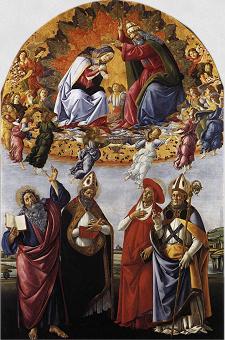
Home
Gregory XVII "Siri" The Pope in Red
The Coming Great Catholic Monarch
St. John Bosco's Dream (Vision) of Hell
Antichrist
(Catholic Prophecy)

The 1949 Edition
Translated by Rev. Boniface Verheyen, OSB
of St. Benedict's Abbey, Atchison, Kansas
| CHAPTER LVI : Of the Abbot's Table |
| CHAPTER LVII : Of the Artists of the Monastery |
| CHAPTER LVIII : Of the Manner of Admitting Brethren |
But afterward let him live in the apartment of novices, and there let him meditate, eat, and sleep. Let a senior also be appointed for him, who is qualified to win souls, who will observe him with great care and see whether he really seeketh God, whether he is eager for the Work of God, obedience and humiliations. Let him be shown all the hard and rugged things through which we pass on to God.
If he promiseth to remain steadfast, let this Rule be read to him in order after the lapse of two months, and let it be said to him: Behold the law under which thou desirest to combat. If thou canst keep it, enter; if, however, thou canst not, depart freely. If he still persevereth, then let him be taken back to the aforesaid apartment of the novices, and let him be tried again in all patience. And after the lapse of six months let the Rule be read over to him, that he may know for what purpose he entereth. And if he still remaineth firm, let the same Rule be read to him again after four months. And if, after having weighed the matter with himself he promiseth to keep everything, and to do everything that is commanded him, then let him be received into the community, knowing that he is now placed under the law of the Rule, and that from that day forward it is no longer permitted to him to wrest his neck from under the yoke of the Rule, which after so long a deliberation he was at liberty either to refuse or to accept.
Let him who is received promise in the oratory, in the presence of all, before God and His saints, stability, the conversion of morals, and obedience, in order that, if he should ever do otherwise, he may know that he will be condemned by God "Whom he mocketh." Let him make a written statement of his promise in the name of the saints whose relics are there, and of the Abbot there present. Let him write this document with his own hand; or at least, if he doth not know how to write, let another write it at his request, and let the novice make his mark, and with his own hand place it on the altar. When he hath placed it there, let the novice next begin the verse: "Uphold me, O Lord, according to Thy word and I shall live; and let me not be confounded in my expectations" (Ps 118[119]:116). Then let all the brotherhood repeat this verse three times, adding the Gloria Patri.
The let that novice brother cast himself down at the feet of all, that they may pray for him; and from that day let him be counted in the brotherhood. If he hath any property, let him first either dispose of it to the poor or bestow it on the monastery by a formal donation, reserving nothing for himself as indeed he should know that from that day onward he will no longer have power even over his own body.
Let him, therefore, be divested at once in the oratory of the garments with which he is clothed, and be vested in the garb of the monastery. But let the clothes of which he was divested by laid by in the wardrobe to be preserved, that, if on the devil's suasion he should ever consent to leave the monastery (which God forbid) he be then stripped of his monastic habit and cast out. But let him not receive the document of his profession which the Abbot took from the altar, but let it be preserved in the monastery.
| CHAPTER LIXI : Of the Children of the Noble and of the Poor Who Are Offered |
As to their property, let them bind themselves under oath in the same document that they will never give him anything themselves nor through any other person, nor in any way whatever, nor leave a chance for his owning anything; or else, if they refuse to do this and want to make an offering to the monastery as an alms for their own benefit, let them make a donation to the monastery of whatever goods they wish to give, reserving to themselves the income of it, if they so desire. And let everything be so barred that the boy remain in no uncertainty, which might deceive and ruin him (which God forbid) -- a pass we have learned by experience.
Let those who are poor act in like manner. But as to those who have nothing at all, let them simply make the declaration, and with the oblation offer their son in the presence of witnesses.
| CHAPTER LX : Of Priests Who May Wish to Live in the Monastery |
It may be granted him, however, to stand next after the Abbot, and to give the blessing, or to celebrate Mass, but only if the Abbot ordereth him to do so; but if he doth not bid him, let him not presume to do anything under whatever consideration, knowing that he is under the discipline of the Rule, and let him rather give examples of humility to all. But if there is a question of an appointment in the monastery, or any other matter, let him be ranked by the time of his entry into the monastery, and not by the place granted him in consideration of the priesthood.
But if a cleric, moved by the same desire, wisheth to join the monastery, let him too have a middle place, provided he promiseth to keep the Rule and personal stability.
Continue to the...
|
| Return to top of page |
| Bookmark this site |

© StGemma.com Web Productions Inc. 2005=2011. All rights reserved.